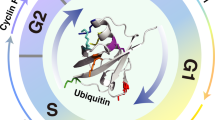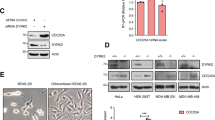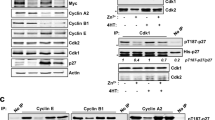Abstract
The cell cycle has been the object of extensive studies for the past years. A complex network of molecular interactions has been identified. In particular, a class of cell cycle inhibitory proteins has been cloned and characterized but details of the molecular mechanism of their action have yet to be resolved. These inhibitors regulate the progression through G1 and the G1/S transition via the inhibition of the cyclin-dependent kinase (Cdk) activity. The potential function of these negative regulators as tumor suppressors provides new insights into the link between the cell cycle and oncogenesis. p27 is a potent inhibitor of Cdks. In quiescent cells p27 accumulates without an increase in mRNA or protein synthesis. Cell cycle regulation of p27 levels, both in normal and transformed human cells, occurs via the ubiquitin–proteasome pathway and, compared to proliferating cells, quiescent cells contain a far lower amount of p27 ubiquitinating activity. The specific proteolysis of p27 is probably involved in the pathway of activation of Cdks. p27 is a phosphoprotein and its phosphorylation is cell cycle regulated. Often phosphorylation is a signal for ubiquitination. p27 is phosphorylated exclusively on serine by Erk1 and almost exclusively on threonine by Cdk1 in in vitro experiments. This finding raises the question of whether and how phosphorylation by these kinases is involved in the process of p27 proteolysis.
This is a preview of subscription content, access via your institution
Access options
Subscribe to this journal
Receive 12 print issues and online access
$259.00 per year
only $21.58 per issue
Buy this article
- Purchase on Springer Link
- Instant access to full article PDF
Prices may be subject to local taxes which are calculated during checkout
Similar content being viewed by others
Author information
Authors and Affiliations
Rights and permissions
About this article
Cite this article
Alessandrini, A., Chiaur, D. & Pagano, M. Regulation of the cyclin-dependent kinase inhibitor p27 by degradation and phosphorylation. Leukemia 11, 342–345 (1997). https://doi.org/10.1038/sj.leu.2400581
Received:
Accepted:
Issue Date:
DOI: https://doi.org/10.1038/sj.leu.2400581
Keywords
This article is cited by
-
Uncovering Cell Cycle Dysregulations and Associated Mechanisms in Cancer and Neurodegenerative Disorders: A Glimpse of Hope for Repurposed Drugs
Molecular Neurobiology (2024)
-
Cip2a promotes cell cycle progression in triple-negative breast cancer cells by regulating the expression and nuclear export of p27Kip1
Oncogene (2017)
-
Phase II trial of bortezomib plus doxorubicin in hepatocellular carcinoma (E6202): a trial of the Eastern Cooperative Oncology Group
Investigational New Drugs (2014)
-
Upregulation of MAPK pathway is associated with survival in castrate-resistant prostate cancer
British Journal of Cancer (2011)
-
Celastrol inhibits tumor cell proliferation and promotes apoptosis through the activation of c-Jun N-terminal kinase and suppression of PI3 K/Akt signaling pathways
Apoptosis (2011)



